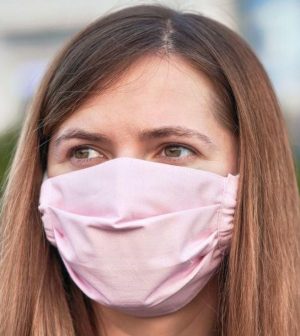- Recognizing the Signs of Hypothyroidism
- 10 Strategies to Overcome Insomnia
- Could Artificial Sweeteners Be Aging the Brain Faster?
- Techniques for Soothing Your Nervous System
- Does the Water in Your House Smell Funny? Here’s Why
- Can a Daily Dose of Apple Cider Vinegar Actually Aid Weight Loss?
- 6 Health Beverages That Can Actually Spike Your Blood Sugar
- Treatment Options for Social Anxiety Disorder
- Understanding the Connection Between Anxiety and Depression
- How Daily Prunes Can Influence Cholesterol and Inflammation
That Face Mask Is Helping to Shield You From Allergens, Too

Here’s an unexpected benefit from wearing a mask during the pandemic: It may also reduce fall allergy symptoms, one expert says.
“Masks that people use for protection from COVID-19, particularly those that filter out more particles like the N95 or KN95 masks, also tend to filter out pollen,” said Dr. Luz Fonacier, president of the American College of Allergy, Asthma and Immunology (ACAAI).
“As we face an increase in the number of COVID-19 cases nationwide, and as more people are putting their masks back on, they may find their allergy symptoms decreasing a bit,” she said in an ACAAI news release.
Every fall, ragweed pollen is the biggest allergy trigger and should be avoided, along with mold and grass pollen. Ragweed usually starts releasing pollen with cool nights and warm days in August and can last into September and October, Fonacier explained. Most people allergic to spring plants are also allergic to ragweed.
There are a number of other things you can do to combat fall allergy symptoms, Fonacier said:
- Start taking your allergy medications about two to three weeks before you normally start to have symptoms and don’t stop taking them until pollen counts have been down for about two weeks.
- Consult an allergist about creating a personal allergy control plan. An allergist can also provide immunotherapy — shots or tablets — that targets your specific triggers and can greatly reduce the severity of your symptoms. Allergy shots can also prevent the development of asthma in some children with seasonal allergies, according to Fonacier.
- Get rid of mold, which can lurk in your basement, bathroom, a leaky cabinet under your sink, or in a pile of dead leaves in your backyard. Moisture control is crucial in reducing mold. Use bathroom fans and remove any standing water immediately. Scrub visible mold from surfaces with detergent and water, and dry completely. Keep home humidity below 60% and clean gutters regularly.
- Keep your car and home windows closed, and your air conditioning on in both places. Monitor pollen and mold counts so you know when it’s best to stay inside.
- When you go outside, wear a hat and sunglasses to keep pollen out of your eyes. After being outdoors, leave your shoes at the door and put clothes in the washing machine. Shower and wash your hair in the evening before bed.
More information
The U.S. National Institutes of Health has more on seasonal allergies.
SOURCE: American College of Allergy, Asthma and Immunology, news release, Aug. 10, 2021
Source: HealthDay
Copyright © 2026 HealthDay. All rights reserved.










